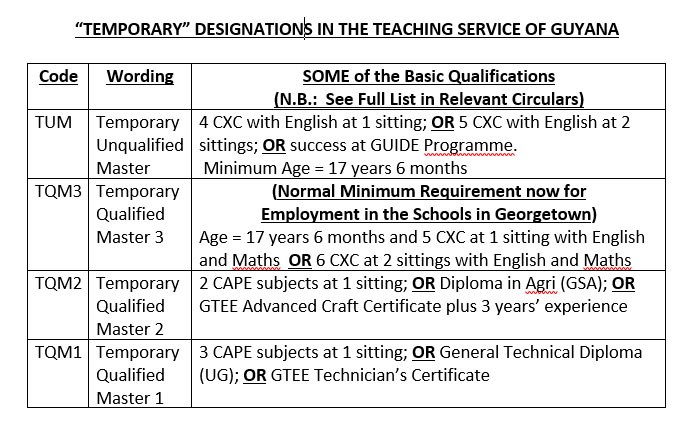Dear Editor,
I note E.B. John’s letter `Not unreasonable for TSC to be expected to show some initiative in relation to teachers’ pay anomalies’ in SN of June 29.
As a member of the Commissions appointed between 1994 and 2008 I will merely say, at this point, that the TSC understood its authority and the authority of the Ministry of Education and the Teachers’ Union. It took a principled position that it would offer no public comment, but from time to time it drew to the attention of various Ministers of Education and senior personnel in that Ministry how poor were teachers’ salaries (and, coincidentally, difficulties the TSC was experiencing in making appointments and having vacancies remain filled for any length of time, based on the push-pull factors of internal and external migration).
Mr. John says: “But with the greatest respect, nothing he has said denies the substantive issue about the poor levels of the remuneration offered to so many qualified teachers, and the responsibilities they so faithfully discharge, and for which they are publicly accountable.” I merely say that I was in the trenches since the 1940s and 1950s learning at the feet of Winston Verbeke and Andrew Jackson and Richard Ishmael in the days of Dual Control of Schools when teachers were paid, not by the Government, but by the Governing Bodies from grants that the Government gave to them. Transport workers had no security of tenure and no pension rights. Terms such as “Casual”, ‘Temporary Casual”, and “Permanent Casual” were commonplace.
I fully recognize “the poor levels of the remuneration offered to so many qualified teachers” and know of the history of the battle, first to get the salary of the Class I teacher on par with that of the Class I Civil Servant; then to go beyond that; then to have the teaching service recognized officially as a professional service, so that no one should be employed as a teacher unless, like a doctor, he/she was first trained professionally.
Mr. John says: “I sincerely hope that we can agree that the Guyana Teachers’ Union is the real co-defaulter in this situation, the other being of course the respective Administrations.”
I agree.
Mr. John says: “Would my colleague deny that Teachers produce talents that enter the Public Service at better rates of pay – albeit for comparatively less responsibility?”
I would not deny that. That is the sort of situation that the Teachers’ Union has historically fought to obviate. But the focus is not on what the Office Assistant starts at. That is the business of his/her Trade Union. The focus of the Teachers’ Union is on what the trained, professional teacher in Guyana is worth, particularly in relation to professional colleagues in the Caribbean and elsewhere. I have never seen a local advertisement for clerks to work in other countries. But advertisements for teachers have been very many.
I draw to attention my article in Guyana Review, Vol. 10, Nos. 109 & 110, January and February 2002: “Going concerns: The exodus of teachers is a growing concern” in which, not only did I draw attention to the recruitment drives by the United States, Botswana, The Bahamas and some other islands in the Caribbean, but I provided a Table showing comparative salaries in US dollar terms. That is only one instance of my publications on these matters.
That is another reason why, over time, I have given the GTU copies of Agreements signed by other teachers’ unions. But the elected GTU leadership is guided by the elected General Council representatives who are presumed to have their ears to the ground among the membership. I would not be so impertinent as to condemn their decisions in public. I offer them a written comment only if specifically asked.
I remind Mr. John that I had sent back to him a copy of his previous letter in SN and had provided a detailed, 17-point series of comments in which I largely agreed with his position, but gave him the historical context in respect of each matter. One such comment on “permanent temporary teachers” may be of some general interest:
12. Again, this is a matter of the historical development of Education in Guyana. The agreement between the Government and the Teachers Union was that no one would be appointed a teacher, unless he was first trained. The Govern-ment committed to expanding teacher training exponentially – which it really, really tried hard to do – to take care of the needs. Every new teacher who was not a trained teacher was therefore designated “temporary” and given three (3) years in which to seek training. But as fast as the Government trained, the teachers left for better salaries elsewhere. The trickle became a flood. [See for example, Cave (1986) “Emphasis in Teacher Train-ing” or Cave (1998) “A Brief Comment on Accessing Promotional Benefits in the Teaching Service of Guyana” or Cave (2001) “The Guyanese Teacher and the Overseas Recruitment Drives”]
Mr. John says: “It must no longer be argued that there is no capacity to pay better, moreso in the face of the Grant Donor’s reported observation of low returns from the education system. We must insist on caring about Teachers, of whom already there is a scarcity.”
I endorse his words.
So how do we, as a nation, go forward from here, please?
Would Mr. John be willing to provide the GTU with a draft of the sort of fewer-than-28-grade salaries structure that he has in mind?
I don’t have the trained skills.
The GTU may not have the expertise.
Perhaps funding from the current Grant Donor may be available.
Yours faithfully,
George N. Cave





